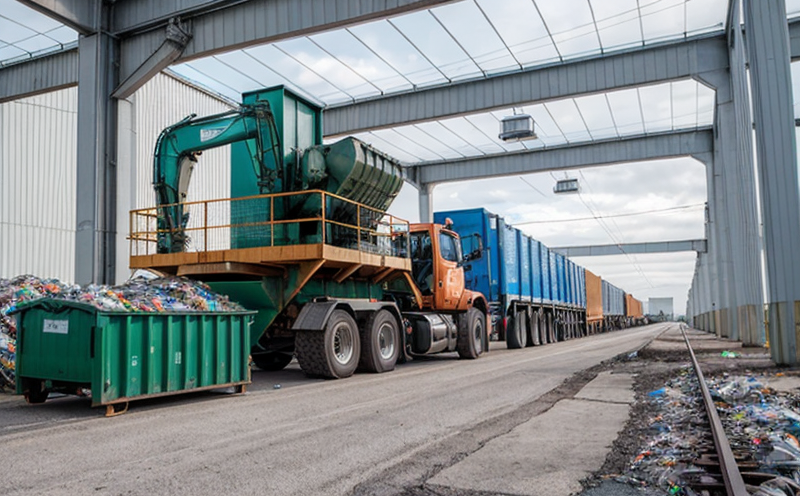ISO 11469 Plastics Marking Testing for Recycling Identification
The implementation of ISO 11469 standards in industrial recycling processes is critical for ensuring accurate and reliable identification of plastics during the recycling process. This standard provides a framework for marking recycled plastics with unique identifiers that facilitate traceability, quality control, and compliance with regulatory requirements.
ISO 11469 specifies detailed procedures for the application of durable markings on post-consumer plastic waste to enhance its recyclability. The marking must be legible and capable of withstanding mechanical processing and chemical treatments without significant loss of information. This standard is particularly important in sectors where sustainability and circular economy initiatives are key priorities.
Eurolab's expertise in ISO 11469 compliance ensures that our clients meet the stringent requirements set forth by this international standard. Our state-of-the-art facilities provide precise and reliable testing to verify the durability, legibility, and permanence of markings on recycled plastics. This allows manufacturers and processors to confidently implement recycling processes that comply with global standards.
Our team of highly skilled professionals utilizes advanced equipment and methodologies to conduct thorough assessments. From specimen preparation and marking application to visual inspection and mechanical testing, we ensure each step adheres strictly to ISO 11469 guidelines. This comprehensive approach guarantees accurate results and robust compliance verification.
The significance of ISO 11469 in the context of industrial manufacturing cannot be overstated. By integrating this standard into recycling processes, industries can enhance their environmental impact by promoting resource efficiency. This aligns with broader sustainability goals while also ensuring product quality and consistency. Compliance with ISO 11469 helps businesses navigate complex regulatory environments, fostering trust among consumers and stakeholders.
Incorporating durable markings on recycled plastics not only improves traceability but also supports the development of circular economy practices. By accurately identifying material batches, manufacturers can optimize production processes, reduce waste, and minimize environmental footprints. This aligns with broader sustainability goals while also ensuring product quality and consistency.
The reliability and accuracy of ISO 11469 marking testing are essential for maintaining high standards in industrial recycling. Our laboratory adheres strictly to the specified criteria, ensuring that all tests meet or exceed international standards. With a strong emphasis on precision and repeatability, we deliver consistent results that instill confidence in our clients.
Our comprehensive approach to ISO 11469 marking testing includes thorough documentation of every test procedure and result. This ensures transparency and traceability throughout the entire process. By leveraging advanced technology and rigorous methodologies, we provide robust evidence supporting compliance with this important standard.
At Eurolab, we understand the critical role that ISO 11469 plays in advancing sustainable practices within industrial recycling processes. Our commitment to excellence ensures that our clients receive reliable and accurate testing services, contributing to a more environmentally conscious future.
Benefits
The implementation of ISO 11469 marking testing offers numerous benefits for businesses involved in industrial recycling and circular economy processes. These include:
- Enhanced Traceability: The ability to accurately track recycled plastic batches improves supply chain management.
- Improved Quality Control: Consistent marking ensures uniformity in product quality throughout the recycling process.
- Compliance with International Standards: Meeting ISO 11469 requirements demonstrates a commitment to global best practices and regulatory compliance.
- Promotion of Circular Economy Practices: By accurately identifying recycled plastics, businesses can contribute to more sustainable production cycles.
- Increased Market Confidence: Reliable marking enhances consumer trust in the products made from recycled materials.
- Competitive Advantage: Demonstrating adherence to stringent international standards can differentiate a company within its market segment.
- Educational Value: Comprehensive testing provides valuable insights into material behavior under various conditions, aiding R&D efforts.
These benefits underscore the importance of ISO 11469 marking testing in achieving sustainable and efficient recycling processes. By embracing this standard, businesses can enhance their operational effectiveness while contributing positively to environmental conservation efforts.
Eurolab Advantages
At Eurolab, we pride ourselves on delivering top-tier services that meet the highest standards of accuracy and reliability. Our advantages in providing ISO 11469 marking testing for recycling identification include:
- State-of-the-Art Facilities: Equipped with cutting-edge equipment, our laboratory ensures precise and repeatable results.
- Experienced Professionals: Our team of experts brings extensive knowledge and experience in plastics marking testing.
- Dedicated Resources: We allocate dedicated resources to ensure timely delivery of test results.
- Comprehensive Reporting: Detailed reports provide comprehensive insights into the performance of marked samples.
- Customer-Centric Approach: Our focus on meeting client needs ensures tailored solutions for various industrial requirements.
- Regulatory Expertise: We stay abreast of evolving regulations and guidelines to ensure compliance with international standards.
- Sustainability Focus: Our commitment to sustainability aligns with the broader goals of circular economy practices.
These advantages underscore our dedication to excellence in ISO 11469 marking testing. By partnering with Eurolab, businesses can achieve reliable and accurate results that support their sustainable initiatives.
Why Choose This Test
Selecting the right test for your industrial recycling processes is crucial for ensuring compliance and quality control. Here’s why choosing ISO 11469 marking testing is advantageous:
- Global Recognition: Adherence to international standards like ISO ensures compatibility with global markets.
- Reputation Building: Demonstrating commitment to sustainability enhances brand reputation and consumer trust.
- Regulatory Compliance: Meeting ISO 11469 requirements helps avoid potential legal issues and fines.
- Operational Efficiency: Accurate marking improves supply chain management, leading to streamlined operations.
- Data-Driven Decisions: Reliable test results provide valuable insights for optimizing recycling processes.
- Innovation Support: Comprehensive testing supports R&D efforts by providing robust data on material performance.
The choice of ISO 11469 marking testing is a strategic decision that contributes to the long-term success and sustainability of industrial recycling initiatives. By investing in this service, businesses can ensure they are at the forefront of sustainable practices while maintaining high standards of quality control.





